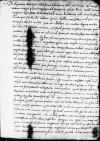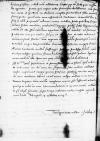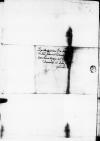Equidem, Dantisce clarissime, silentium tuum non incuso, ipse necessitatem magis quam negligentiam praetexens. Praeter hanc nullam invenio causam, nisi forte delicatas vestras aures barbaries nostra nimium offusa laeserit, qui scribendo crebrior quam doctior esse soleo. Nostra sine controversia itaque sit oratio, qua nec doctior nec melior legens evadas. Haec mea est fortassis natura vel fatum potius, ut plura semper quam meliora faciam, series rei ad manum paranti conatu supremo iteratis epistulis amicos multos idque hoc celerius quo sincerius rideor a sorte pro multis multum or nullum⌈m ms. n(!)
⌈mm ms. n(!)
⌉ultummultum or nullum⌉ accipiens. Consultius igitur erit et ipsum me intra silentii limites continere donec serena dies transquilliorem dederit aerem. Levi negotio ferendum est, quod nihil nisi amicorum copia desit, ea de re nihil p[res]sus or p[as]sus paper damaged⌈pres paper damaged⌈[res]res paper damaged⌉susp[res]sus or p[as]sus paper damaged⌉ scribo, si unum hoc indicavero te in Valladolid (Vallisoletum, Oleti vallis), city in central Spain, Castile and León, on the Pisuerga river⌊Valle OletiValladolid (Vallisoletum, Oleti vallis), city in central Spain, Castile and León, on the Pisuerga river⌋ me Naples (Napoli, Neapolis), city in Italy, on the coast of the Tyrrhenian Sea, capital of the region of Campania⌊NeapoliNaples (Napoli, Neapolis), city in Italy, on the coast of the Tyrrhenian Sea, capital of the region of Campania⌋ esse per omnia nobis contr stain⌈[r]r stain⌉aria accedere, praeter forte iustitiae ardorem ubique parem, nisi hic sit hoc rarior, quo princeps remotior. Et interim tamen in ipsis deliciis Neapolitanis amicorum memoria hac dulcedine suavior, interturbant morbi animi tranquillitatem, urgemur reditus desiderio, tenemur litterarum (sed hactenus frustra) spe immodica, res supra captum meum, ab ipsis meis datus sum oblivioni. Sed age, ita abeat quasi a longinquo non sint petendae voluptates iure quodam, quod penes se isti locatas solum contendunt. Mihi certe Poland (Kingdom of Poland, Polonia)⌊PoloniaPoland (Kingdom of Poland, Polonia)⌋, Italy (Italia)⌊ItaliaItaly (Italia)⌋, Cracow (Kraków, Cracovia), city in southern Poland, Małopolska, on the Vistula river, from 1038 capital of the Kingdom of Poland⌊CracoviaCracow (Kraków, Cracovia), city in southern Poland, Małopolska, on the Vistula river, from 1038 capital of the Kingdom of Poland⌋, Rome (Roma), city in central Italy, on the Tiber river, seat of the Holy See⌊RomaRome (Roma), city in central Italy, on the Tiber river, seat of the Holy See⌋ Naples (Napoli, Neapolis), city in Italy, on the coast of the Tyrrhenian Sea, capital of the region of Campania⌊NeapolisNaples (Napoli, Neapolis), city in Italy, on the coast of the Tyrrhenian Sea, capital of the region of Campania⌋que atque adeo paradisus ipse est, uxor vera Venus, et si quid huic formosius quiddam reperiri poterit, iam me habes. Vides, quam non sim omnino miser, quid si oporteret a silentibus istis aurum emungere, putasne conduplicata cura amara omnia esse? Ego tamen ea in re adeo facilis ... illegible⌈...... illegible⌉ e(ss)e deliberatione non eguerim, a te ne litteras quidem, auri non inops, extorquere paper damaged⌈[e]e paper damaged⌉ valeo. At adscribed⌈AtAt adscribed⌉ venio ne tibi adhuc suspectus purgavi me, immo non purgavi, cum ea macula non fuerim compressus nisi per risum verba excipiantur ad crimen, ita est in facie naevus magis conspicuus. Interim, qui toto pectore candorem abiciunt, ne notantur quidem. Reddidi ego tibi in hac causa rationem
 AAWO, AB, D.3, f. 5v
discedens per epistulam nihil nunc additurus. Scripsi ego iam satis quae in Italy (Italia)⌊ItaliaItaly (Italia)⌋ aguntur, pacem, quae nuper inter principes Christianos coit, Adrian VI (Adriaan Florenszoon Boeyens) (*1459 – †1523), 1522-1523 Pope⌊pontificis hidden by binding⌈[tificis]tificis hidden by binding⌉ RomaniAdrian VI (Adriaan Florenszoon Boeyens) (*1459 – †1523), 1522-1523 Pope⌋ mors et The French ⌊GallorumThe French ⌋ in Italy (Italia)⌊ItaliamItaly (Italia)⌋ eruptio perturbant. Illa omnibus hidden by binding⌈[us]us hidden by binding⌉ ferme grata, quod vita meo responderit vaticinio et ambitur hoc infelix (si recte perpenditur culmen) miris artibus, pridie quam has scripsi College of Cardinals ⌊cardinei patresCollege of Cardinals ⌋ conclave (quod vocant) ingressi postquam satis largitionibus hidden by binding⌈[s]s hidden by binding⌉ artatum sit, illic spiritum sanctum rogaturi votis eorum accedat, ut faciant pontificem non qui melior, sed qui sit nummosior et vota redimat carius. Ea sunt studia immo ingenia, ut extincta potius quam emendata velint ea quae temporalibus diminutis ad aeterna magis facerent. Clement VII (Giulio de' Medici) (*1478 – †1534), 1523-1534 Pope⌊Medices cardinalisClement VII (Giulio de' Medici) (*1478 – †1534), 1523-1534 Pope⌋ multorum suffragiis putatur pontifex futurus. Nosti tu aliquantisper qualem simus habituri pontificem Poland (Kingdom of Poland, Polonia)⌊PoloniaePoland (Kingdom of Poland, Polonia)⌋ ex Rome (Roma), city in central Italy, on the Tiber river, seat of the Holy See⌊Romana urbeRome (Roma), city in central Italy, on the Tiber river, seat of the Holy See⌋ cum istis spero vos quis victor ev stain⌈[ev]ev stain⌉aserit habituros.
AAWO, AB, D.3, f. 5v
discedens per epistulam nihil nunc additurus. Scripsi ego iam satis quae in Italy (Italia)⌊ItaliaItaly (Italia)⌋ aguntur, pacem, quae nuper inter principes Christianos coit, Adrian VI (Adriaan Florenszoon Boeyens) (*1459 – †1523), 1522-1523 Pope⌊pontificis hidden by binding⌈[tificis]tificis hidden by binding⌉ RomaniAdrian VI (Adriaan Florenszoon Boeyens) (*1459 – †1523), 1522-1523 Pope⌋ mors et The French ⌊GallorumThe French ⌋ in Italy (Italia)⌊ItaliamItaly (Italia)⌋ eruptio perturbant. Illa omnibus hidden by binding⌈[us]us hidden by binding⌉ ferme grata, quod vita meo responderit vaticinio et ambitur hoc infelix (si recte perpenditur culmen) miris artibus, pridie quam has scripsi College of Cardinals ⌊cardinei patresCollege of Cardinals ⌋ conclave (quod vocant) ingressi postquam satis largitionibus hidden by binding⌈[s]s hidden by binding⌉ artatum sit, illic spiritum sanctum rogaturi votis eorum accedat, ut faciant pontificem non qui melior, sed qui sit nummosior et vota redimat carius. Ea sunt studia immo ingenia, ut extincta potius quam emendata velint ea quae temporalibus diminutis ad aeterna magis facerent. Clement VII (Giulio de' Medici) (*1478 – †1534), 1523-1534 Pope⌊Medices cardinalisClement VII (Giulio de' Medici) (*1478 – †1534), 1523-1534 Pope⌋ multorum suffragiis putatur pontifex futurus. Nosti tu aliquantisper qualem simus habituri pontificem Poland (Kingdom of Poland, Polonia)⌊PoloniaePoland (Kingdom of Poland, Polonia)⌋ ex Rome (Roma), city in central Italy, on the Tiber river, seat of the Holy See⌊Romana urbeRome (Roma), city in central Italy, on the Tiber river, seat of the Holy See⌋ cum istis spero vos quis victor ev stain⌈[ev]ev stain⌉aserit habituros.
Ad reverendissimos Piotr Tomicki (*1464 – †1535), humanist, statesman, diplomat, one of the most trusted collaborators of King Sigismund I of Poland; 1500-1503 Chancellor of Cardinal Fryderyk Jagiellon, 1502 Gniezno Cantor, Archdeacon of Cracow, 1503-1505 servant of Jan Lubrański, Bishop of Poznań, 1504-1510 Canon of Poznań, 1506 royal scribe, 1507-1519 Grand(?) Secretary, 1509 Canon of Włocławek, 1510-1514 - of Gniezno, 1511 Custos in Kielce and Sandomierz, 1514 Bishop of Przemyśl; 1515 Crown Vice-Chancellor, 1520 Bishop of Poznań, 1523 - of Cracow; from 1524 (at least) General Collector of świętopietrze (Peter's pence), 1509 royal envoy to the Dukes of Pomerania and to Mecklenburg, 1510 - to Wallachia, 1510, 1511, 1512, 1513 - to Hungary (WYCZAŃSKI 1990, p. 268)
Andrzej Krzycki (Andreas Cricius) (*1482 – †1537), humanist, neo-Latin poet, diplomat, correspondent of Erasmus of Rotterdam; in 1525 he took part in the negotiations leading to the secularisation of the state of the Teutonic Order; from 1504 Canon of Poznań (from 1511 Scholastic, from 1519 Provost); from 1512 Canon of Cracow, Scholastic of Płock, and secretary to the first wife of Sigismund I Jagiellon, Barbara Zápolya; 1515-1523 royal secretary; 1518-1530 Provost of the Chapter of St. Florian in Cracow; 1522-1525 Bishop of Przemyśl; 1525-1527 Bishop of Poznań; 1527-1535 Bishop of Płock; 1535-1537 Archbishop of Gniezno, Primate of Poland (PSB 15, p.544-549)⌊dominos Posnaniensem et PremisliensemPiotr Tomicki (*1464 – †1535), humanist, statesman, diplomat, one of the most trusted collaborators of King Sigismund I of Poland; 1500-1503 Chancellor of Cardinal Fryderyk Jagiellon, 1502 Gniezno Cantor, Archdeacon of Cracow, 1503-1505 servant of Jan Lubrański, Bishop of Poznań, 1504-1510 Canon of Poznań, 1506 royal scribe, 1507-1519 Grand(?) Secretary, 1509 Canon of Włocławek, 1510-1514 - of Gniezno, 1511 Custos in Kielce and Sandomierz, 1514 Bishop of Przemyśl; 1515 Crown Vice-Chancellor, 1520 Bishop of Poznań, 1523 - of Cracow; from 1524 (at least) General Collector of świętopietrze (Peter's pence), 1509 royal envoy to the Dukes of Pomerania and to Mecklenburg, 1510 - to Wallachia, 1510, 1511, 1512, 1513 - to Hungary (WYCZAŃSKI 1990, p. 268)
Andrzej Krzycki (Andreas Cricius) (*1482 – †1537), humanist, neo-Latin poet, diplomat, correspondent of Erasmus of Rotterdam; in 1525 he took part in the negotiations leading to the secularisation of the state of the Teutonic Order; from 1504 Canon of Poznań (from 1511 Scholastic, from 1519 Provost); from 1512 Canon of Cracow, Scholastic of Płock, and secretary to the first wife of Sigismund I Jagiellon, Barbara Zápolya; 1515-1523 royal secretary; 1518-1530 Provost of the Chapter of St. Florian in Cracow; 1522-1525 Bishop of Przemyśl; 1525-1527 Bishop of Poznań; 1527-1535 Bishop of Płock; 1535-1537 Archbishop of Gniezno, Primate of Poland (PSB 15, p.544-549)⌋ immo et Rafał Leszczyński (†1527), diplomat, studied in Padua; secretary of Sigismund Jagiellon as duke of Głogów; 1509 starosta of Człuchów; 1507-1520 royal secretary; 1510 canon of Poznań; 1512 - of Gniezno; 1518 - of Cracow; 1518 castellan of Ląd; 1520 bishop of Przemyśl; 1522 - of Płock; 1507, 1508, 1512, 1513, 1514 royal envoy to the Estates and town of Prussia; 1507, 1511, 1516 - to the Teutonic Order; 1509, 1514, 1515, 1517, 1518 - to the emperor; 1509, 1515 - to Venice and Rome; 1511, 1519 - to the Roman Empire; 1517 - to Western Pomerania (WYCZAŃSKI 1990, p. 257; Urzędnicy 1/2)⌊PlocensemRafał Leszczyński (†1527), diplomat, studied in Padua; secretary of Sigismund Jagiellon as duke of Głogów; 1509 starosta of Człuchów; 1507-1520 royal secretary; 1510 canon of Poznań; 1512 - of Gniezno; 1518 - of Cracow; 1518 castellan of Ląd; 1520 bishop of Przemyśl; 1522 - of Płock; 1507, 1508, 1512, 1513, 1514 royal envoy to the Estates and town of Prussia; 1507, 1511, 1516 - to the Teutonic Order; 1509, 1514, 1515, 1517, 1518 - to the emperor; 1509, 1515 - to Venice and Rome; 1511, 1519 - to the Roman Empire; 1517 - to Western Pomerania (WYCZAŃSKI 1990, p. 257; Urzędnicy 1/2)⌋ episcopos nihil scribo, certe vereor, ne litterae meae sine sapore et sine iudicio crebriter missae impediant magis quam prosint quamque merito me profu hidden by binding⌈[fu]fu hidden by binding⌉sio mea vindicare debeat et ab omni culpa reddere immunem. Tamen tu quaeso bona nacta occasione amici fac officium utrobique hidden by binding⌈[ue]ue hidden by binding⌉ quod ex re videtur in mei et commendationem et excusationem adductum hidden by binding⌈[um]um hidden by binding⌉. Et ipse aliquando silentio (si pertinax iudicari nolis) rupto rescribere cura.
Vale.
 AAWO, AB, D.3, f. 5v
discedens per epistulam nihil nunc additurus. Scripsi ego iam satis quae in
AAWO, AB, D.3, f. 5v
discedens per epistulam nihil nunc additurus. Scripsi ego iam satis quae in 

